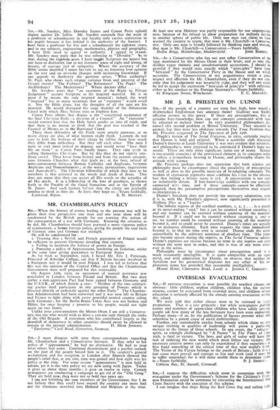Sue—Mr. Sanders, Miss Dorothy Sayers and Canon Potts uphold dogma
against Dr. Se!hie. Mr. Sanders contends that the work of a professor or schoolmaster in any faculty only carries conviction to his pupils because it has behind it the authority of the learned. I have been a professor for five and a schoolmaster for eighteen years, and in my subjects, engineering, mathematics, physics and geography, I have little need to appeal to authority. I appeal to reason. Mr. Sanders may reply that he was referring to "Divinity." .A.s to that, during the eighteeh-years I have taught Scripture my appeal has not been to Authority, but to my listeners' sense of right and wrong, of beauty, of courage and of sympathy. Where the accuracy of the Bible seems doubtful I never hes:tate to say so, knowing how opinion on the text and on miracles changes with increasing knowledge. If one appeals to Authority the question arises, "What authority? St. Paul, who shows such strange variance from and ignoring of the Gospel stories? The Fathers? The Reformers? The Pope? The Archbishops? The Moderators?" Where doctors differ . .
Mr. Sanders avers that "an exponent of the Right to Private Judgement" accepts Scripture as his inspired material. He is in, error if he means the only inspired material ; indeed, the word " inspired " has so many meanings that an " exponent " would avoid it. Not the Bible alone, but the thoughts of all the ages are his material. He would disregard the stage thunder of the Athanasian Creed with which Miss Sayers tries to frighten him. Canon Potts affirms that dogma is the "considered acceptance of the final Chr:stian Body—a decision of a Council." An " exponent " would remind him that the Holy Spirit guides us into all truth, and that there. is no reason to think that the goal was reached at the Council of /slicaea or in rhe Baptismal Creed.
These three defenders of the Faith seem utterly unaware, as so many clergy are also, of what laymen really think. Laymen do not care to hurt the feelings of their clergy by telling them how much they differ from orthodoxy. But they tell each other. The men I meet sit very loose indeed to dogmas, and would never "base their life on them" as Canon Potts fondly hopes. They take pride in calling themselves CM' stians. But by this they do not signify any- thing credal. They know from history and from the present antagon- isms between Churches what that leads to ; at the best, refusal of inter-communion between Roman Catholics and Anglicans, between Anglicans and Nonconformists ; at the worst, persecutions, inquisitions and Auto-da-fe's. The Christian fellowship of which they love to be members is that pictured in the words and deeds of Jesus. This does not mean that they can accept all His words or the actuality of all His deeds. It is a fellowship of the love of goodness, as shown forth in the Parable of the Good Samaritan and in the Epistle of St. James. And such laymen bel:eve that the clergy are gradually coming to think as they do. At least, they hope so.—Yours faithfully,






























 Previous page
Previous page